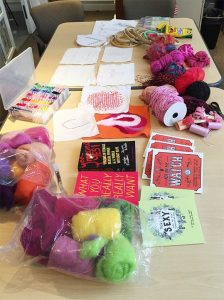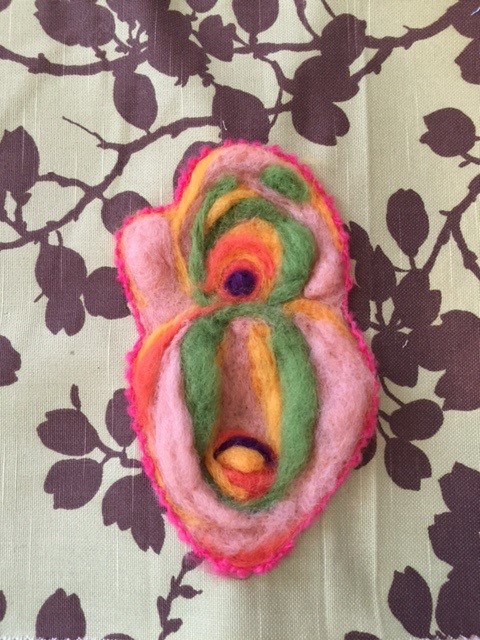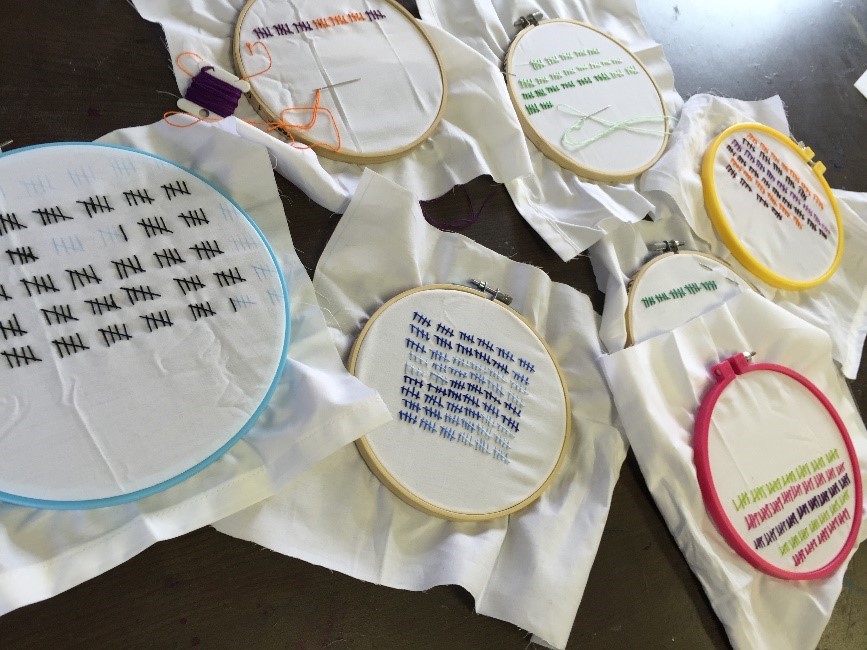By Lauren Leone, ATR-BC, LMHC; Michaela Kirby, PsyD, ATR-BC, LMHC; and Nancy Lautenbach, MA | June 29, 2016 | Education | Events
“Felt and yarn, things I only associated with being soft and warm, are now materials that I see as strong, empowering and secure. It also does help that there is so much meaning in using an art form that was really seen as women’s work to spread awareness about social justice for women.”
— Gopi Shah, Craft & Chat workshop participant
Participants in the “Consent and Bystander Empowerment” workshop, April 2016
What does it look like to use art therapy for social action on a college campus? How would you encourage college students to use art to address complex issues of feminism and women’s sexuality? Recently, we conducted a series of “Craft & Chat” workshops at Lesley University to provide a safe place for students to gather, engage with fiber arts, and find empowerment through craftivism and discussion of critical women’s issues.
 The term “craftivism” was coined about a decade ago to represent the practice of using craft for activism, primarily for social and political change. The roots of the craftivism movement came from the proliferation of DIY (do-it-yourself) culture and online crafting communities in the early 21st century and was based on adopting mediums traditionally associated with “women’s work” – e.g. knitting, embroidery, quilting, crocheting – and re-appropriating them to communicate a social or political message. We were drawn to the social justice mission of craftivism, and its potential for community building. We also recognized common benefits that craftivism and art therapy share, such as fostering empowerment, encouraging communication, and placing importance on both the process and the product.
The term “craftivism” was coined about a decade ago to represent the practice of using craft for activism, primarily for social and political change. The roots of the craftivism movement came from the proliferation of DIY (do-it-yourself) culture and online crafting communities in the early 21st century and was based on adopting mediums traditionally associated with “women’s work” – e.g. knitting, embroidery, quilting, crocheting – and re-appropriating them to communicate a social or political message. We were drawn to the social justice mission of craftivism, and its potential for community building. We also recognized common benefits that craftivism and art therapy share, such as fostering empowerment, encouraging communication, and placing importance on both the process and the product.
Three art therapists contributed to the project: art therapy faculty Michaela Kirby and Lauren Leone and recent MA in art therapy graduate Nancy Lautenbach. Inspiration came from several sources: Lauren and Nancy had attended a workshop at the AATA Conference in 2014 on The Wandering Uterus Project with Savneet Talwar, Angela Lyonsmith and Raman Molitor. Michaela had previously given a series of talks on the undergraduate campus titled “Clit Chat” which focused on women’s sexuality.
We designed and promoted a series of three workshops for the Spring 2016 semester, with the themes of sexual health, reproductive justice, and consent. We added two additional events as the semester progressed: one to support the 5.4 Million & Counting project by Chi Nguyen to raise awareness about HB2, a reproductive justice case currently under consideration by the Supreme Court, and a second workshop about consent that followed a campus screening of The Hunting Ground, a documentary film about sexual assault on college campuses. Expanding to include specific current events allowed us to be responsive to the college environment.
The workshops were two hours in length and were cosponsored by the Lesley University Women’s Center. We had a rich, enticing supply of needle felting and embroidery materials and participants had the option of working on illustrations already sketched on fabric or creating their own designs. Pre-sketched options included internal and external female sexual anatomy or empowering phrases such as, “Yes Means Yes,” “My Body is Mine,” or “Ovaries before Brovaries.” We also provided educational materials such as NARAL report cards on reproductive rights, educational comics by Isabella Rotman, and local and campus resources.
(Left) A needle-felted image of a vulva and (right) embroidering tally marks for the the 5.4 Million & Counting quilt project.
The Craft & Chat workshops flourished over the semester, with more participants joining each time. Many students who participated in earlier workshops came back for subsequent sessions and brought their friends. The workshops became part of the undergraduate community and felt like a testament to the power of art to build community and foster empowerment. In the words of participant Gopi Shah, “When I went to my first workshop I honestly was more intrigued by the art aspect of it. I was never previously involved in any sort of activism so I was very unfamiliar with the idea of craftivism. Craftivism sparks a conversation, and that is probably my favorite part about the workshops. I feel that the discussion is necessary and just as important as the art.”
Contributors:
Lauren Leone, ATR-BC, LMHC, is an artist and art therapist who lives in Somerville, MA, where she sees clients in private practice and teaches undergraduate and graduate art therapy courses at Lesley University. She is currently working towards her Professional Doctorate of Art Therapy at Mount Mary University, focusing on how fiber arts and the craftivism movement can inform art therapy practice. Lauren has been using embroidery in her art for over a decade and is particularly drawn to its rhythmic, meditative pace. She is interested in connecting with others who use fiber art in their personal art making and/or therapy practice and can be contacted at: laurenleone.atr@gmail.com.
Michaela Kirby, Psy.D., ATR-BC, LMHC, is an art therapist and licensed psychologist and has an art studio in Somerville, MA. She has been on the faculty of Lesley University for 16 years and has created and taught a sexuality course for several art therapy Masters programs. She is also holding a Focus Group on Sexuality at the AATA Conference in Baltimore so please come and join in the discussion about increasing awareness of sexuality in the art therapy field.
Nancy Lautenbach, MA, is an interdisciplinary artist and art therapist working toward her ATR who lives in Easthampton, MA and has taught adjunct at Springfield College. She is committed to working with people around issues of sexualized violence, disordered eating and body image, and other health and wellness issues. Through her graduate work, Nancy started a daily art practice committed to issues of the body, which can be viewed here. Nancy’s body of work addresses her current interests in somatic experiencing, sacred sexuality, and the psychology of trauma on the body.




